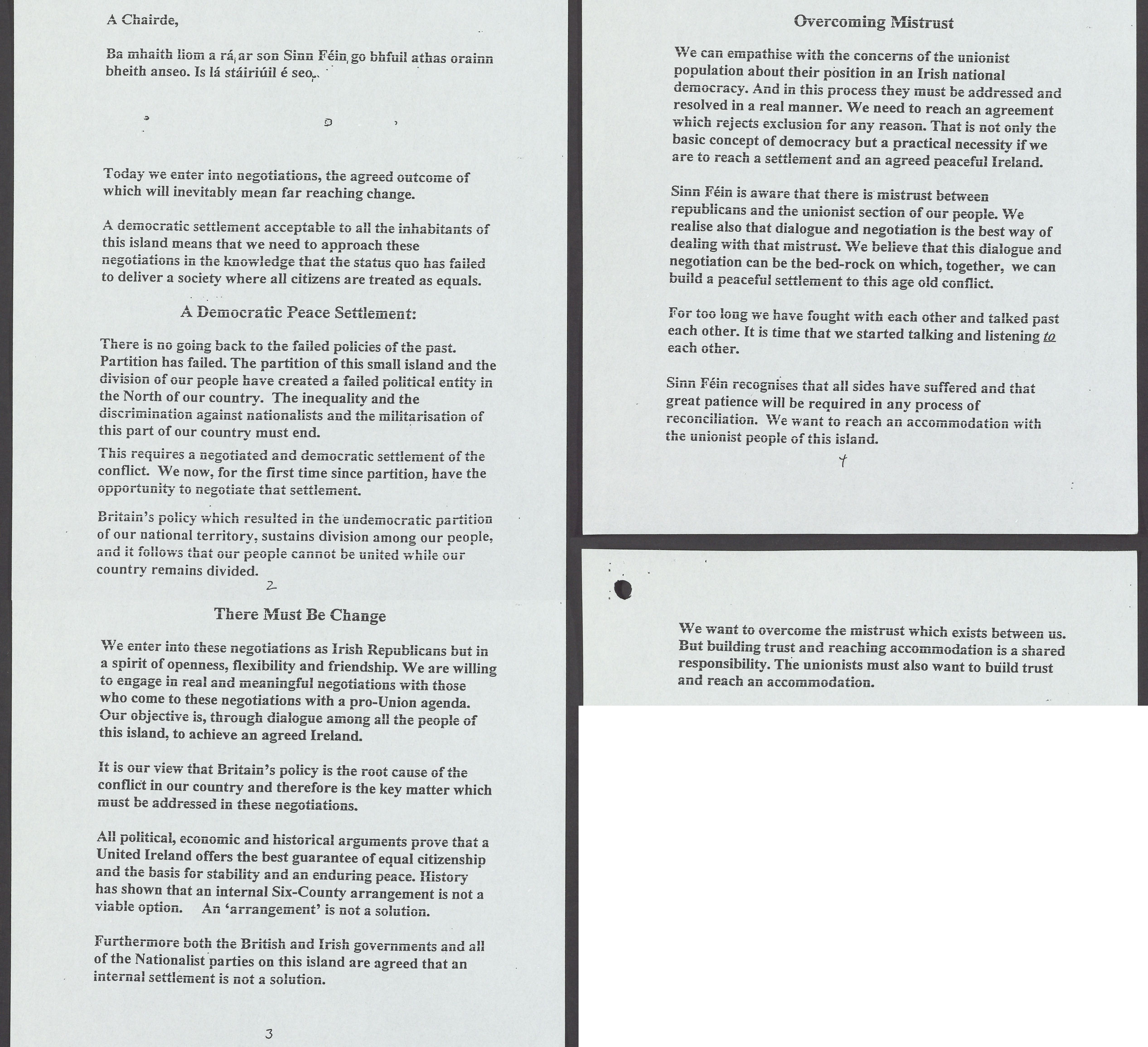
Extracts from an opening statement by Martin McGuinness, Sinn Féin’s Vice President and chief negotiator at the peace talks in Stormont, Belfast, 7 October 1997. The title of the statement was ‘A New Beginning.’ Catalogue reference: PREM 49/403
Transcript
A Chairde,
Ba mhaith liom a rá ar son Sinn Féin, go bhfuil athas orainn bheith anseo. Is lá stáiriúil é seo.
Today we enter into negotiations, the agreed outcome of which will inevitably mean far reaching change.
A democratic settlement acceptable to all the inhabitants of this island means that we need to approach these negotiations in the knowledge that the status quo has failed to deliver a society where all citizens are treated as equals.
A Democratic Peace Settlement:
There is no going back to the failed policies of the past. Partition has failed. The partition of this small island and the division of our people have created a failed political entity in the North of our country. The inequality and the discrimination against nationalists and the militarisation of this part of our country must end.
This requires a negotiated and democratic settlement of the conflict. We now, for the first time since partition, have the opportunity to negotiate that settlement.
Britain’s policy which resulted in the undemocratic partition of our national territory, sustains division among our people, and it follows that our people cannot be united while our country remains divided.
There Must Be Change
We enter into these negotiations as Irish Republicans but in a spirit of openness, flexibility and friendship. We are willing to engage in real and meaningful negotiations with those who come to these negotiations with a pro-Union agenda. Our objective is, through dialogue among all the people of this island, to achieve an agreed Ireland.
It is our view that Britain’s policy is the root cause of conflict in our country and therefore is the key matter which must be addressed in these negotiations.
All political, economic and historical arguments prove that a United Ireland offers the best guarantee of equal citizenship and the basis for stability and an enduring peace. History has shown that an internal Six-County arrangement is not a viable option. An ‘arrangement’ is not a solution.
Overcoming Mistrust
We can empathise with the concerns of the unionist population about their position in an Irish national democracy. And in this process they must be addressed and resolved in a real manner. We need to reach an agreement which rejects exclusion for any reason. That is not only the basic concept of democracy but a practical necessity if we are to reach a settlement and an agreed peaceful Ireland.
Sinn Féin is aware that there is mistrust between republicans and the unionist section of our people. We realise also that dialogue and negotiation is the best way of dealing with that mistrust. We believe that this dialogue and negotiation can be the bed-rock on which, together, we can build a peaceful settlement to the age old conflict.
For too long we have fought with each other and talked past each other. It is time that we started talking to each other.
Sinn Féin recognises that all sides have suffered and that great patience will be required in any process of reconciliation. We want to reach an accommodation with the unionist people of this island.
We want to overcome the mistrust which exists between us. But building trust and reaching accommodation is a shared responsibility. The unionists must also want to build trust and reach an accommodation.
- Who wrote this document and what does this reveal about what has changed since the last round of peace talks (Sources C and D)?
- The title of the statement is ‘A New Beginning’. What are the subtitles to the different sections? What do these suggest about the motivation or hopes of the author?
- The opening statement translates as, My friends, I want to say that we, Sinn Féin, are glad to be here. This is a historic day. Why do you think the statement was made in the Irish language?
- Look at the section entitled, ‘A democratic peace settlement’. What does the author think about Partition and the UK government?
- Look at the section entitled, ‘There must be change.’ What is the tone of the first paragraph?
- Who or what does the author blame for conflict in Northern Ireland? What do they believe the solution to be?
- Look at the section entitled, ‘Overcoming mistrust.’ What is the general tone of this section?
- In the final paragraph, is there any evidence of continuing mistrust?
